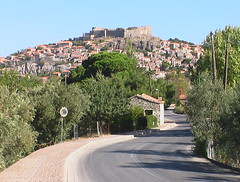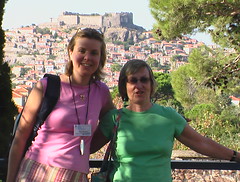Access to new technologies and services is a priority in India and Maitrayee Ghosh gave us a fascinating overview of the kinds of innovative projects which are taking place. I particularly liked the concept of the InfoThela or Infocart- a bicycle front end, with a battery powered information console behind, which works with a wireless connection to the internet and can be taken to small villages to provide general info, health care, agricultural info and much more. I’ll add a photo when I can get one. Maitrayee mentioned many other projects relating to agricultural information, telemedicine and the simputer, a cheap little computer for personal use. The digital divide in India is enormous, exacerbated by the number of different languages spoken in the rural areas.

A street in Molyvos










